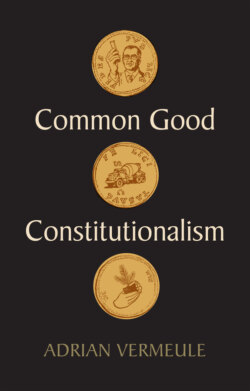Читать книгу Common Good Constitutionalism - Adrian Vermeule - Страница 10
An Interpretive Argument
ОглавлениеHow does this classical view of law relate to constitutional theory today? I will not offer an argument about jurisprudence in the technical academic sense. Although I draw on jurisprudential ideas as necessary, I have nothing original to say in that regard.8 Neither is this a work of legal history, although I draw on legal history done by others in order to recover the powerful tradition of the common good in American law. Finally, it is not a work of political theory.
Rather it is written throughout from the lawyer’s point of view, as a work of interpretation. From that point of view, I offer an account that aims to put our constitutional order, including the administrative state, in its best possible light, given our whole history – not merely our most recent history. As against the progressives and originalists, I suggest that the best overall interpretation overall of our public law requires us to revive the principles of the classical law, looking backward so that we may go forward. It is a case of reculer pour mieux sauter. In terms made famous by Ronald Dworkin,9 the last few chapters of the chain novel are impossible to square with the arc of what went before. They mar the integrity of the whole, and offer a poor account of our operative constitutional order. The point is not to reclaim the insights of the classical tradition out of nostalgia, but because doing so holds out the greatest promise for a principled and coherent interpretation of our current constitutional order as well as its history.
It does not follow, of course, that the interpretation I offer need be parochial or ignore the contributions of legal traditions outside the United States. Indeed my project is quite the opposite: it is to recover and revive the profound connections between the classical American tradition on the one hand, and on the other the classical Roman and European tradition, the ius commune, the latter definitely including the Anglo-American common law as a local variant. The book thus has both a general part and a particular part – a duality that is itself typical of the classical legal framework. It speaks both to general principles of common good constitutionalism and to the specific institutions of the American constitutional order. As such I hope it is of interest to lawyers in the Commonwealth nations, Europe, Latin America, and Asia as well.
Methodologically, this work of interpretation draws not only upon the classical and natural law tradition10 but also, in limited ways, upon the parts of Dworkin’s jurisprudence that are consistent with the classical view of law and that explain and illuminate the latter’s commitments. The principal use I make of Dworkin is negative, invoking him as the unsurpassed modern critic of positivism and originalism in Anglophone legal theory. In my view those withering criticisms have never successfully been answered.11 I illustrate those criticisms of both positivism and originalism with examples from legal and judicial practice: law itself contains general principles,12 rooted in political morality, whose origins do not seem to depend on any particular act of positive lawmaking; positivism and originalism cannot account for theoretical, as opposed to historical, disagreement in interpretation;13 and originalism has never successfully coped with the problem of abstraction, the question of the level of generality at which to read the original understanding.14
Dworkin used to urge “moral readings of the Constitution,”15 implemented through his method of fit and justification.16 Common good constitutionalism shares the view that the positive provisions of the ius civile, including at the constitutional level, can only be interpreted in light of principles of political morality that are themselves part of the law. And it urges that the classical law is the best of our tradition, with the emphasis on both “best” (justification) and “tradition” (fit). But it advocates a different set of substantive moral commitments and priorities and a different account of rights from Dworkin’s, which were all of a conventionally left-liberal and individualist bent. I emphatically eschew Dworkin’s particular, substantively liberal account of justification, which I will take to be detachable. While interpretation necessarily posits some account or other of justification, it need not posit Dworkin’s own account. I reject his liberal theory of rights, as trumps over collective interests, in favor of a classical theory of rights as ius, founded in the injunction of justice to give to every person what is due to them in a political order devoted to the common good.17
In general, nothing in my claims turns on narrow and elaborate debates among professional scholars of jurisprudence about the details and development of Dworkin’s thought. I use those of his ideas that have already become part of the common currency of legal theory, in part because they simply describe with great clarity things that are undeniably a part of law (for example, the ubiquity of legal principles). Not coincidentally, those are the ideas that fit like a glove with the classical conception of law that prevailed in America for so long.
